Tiomate Transcaps 15's
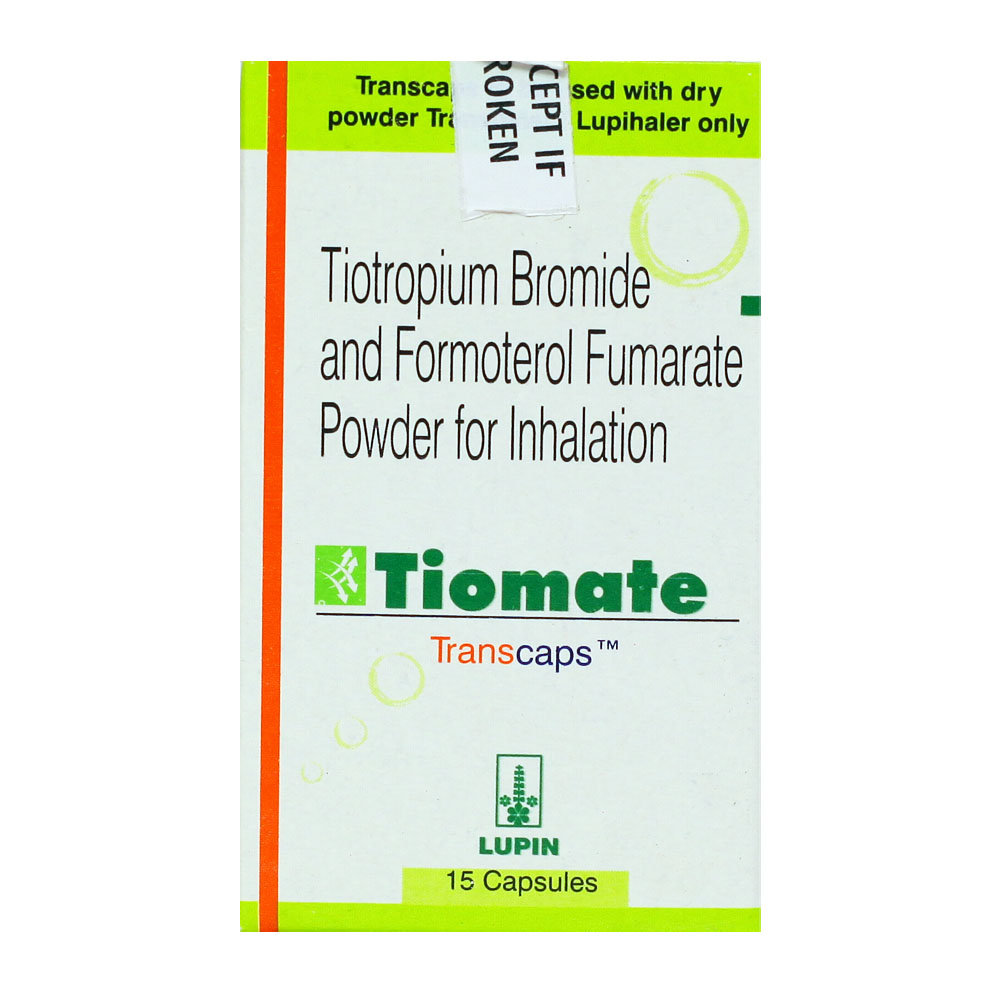
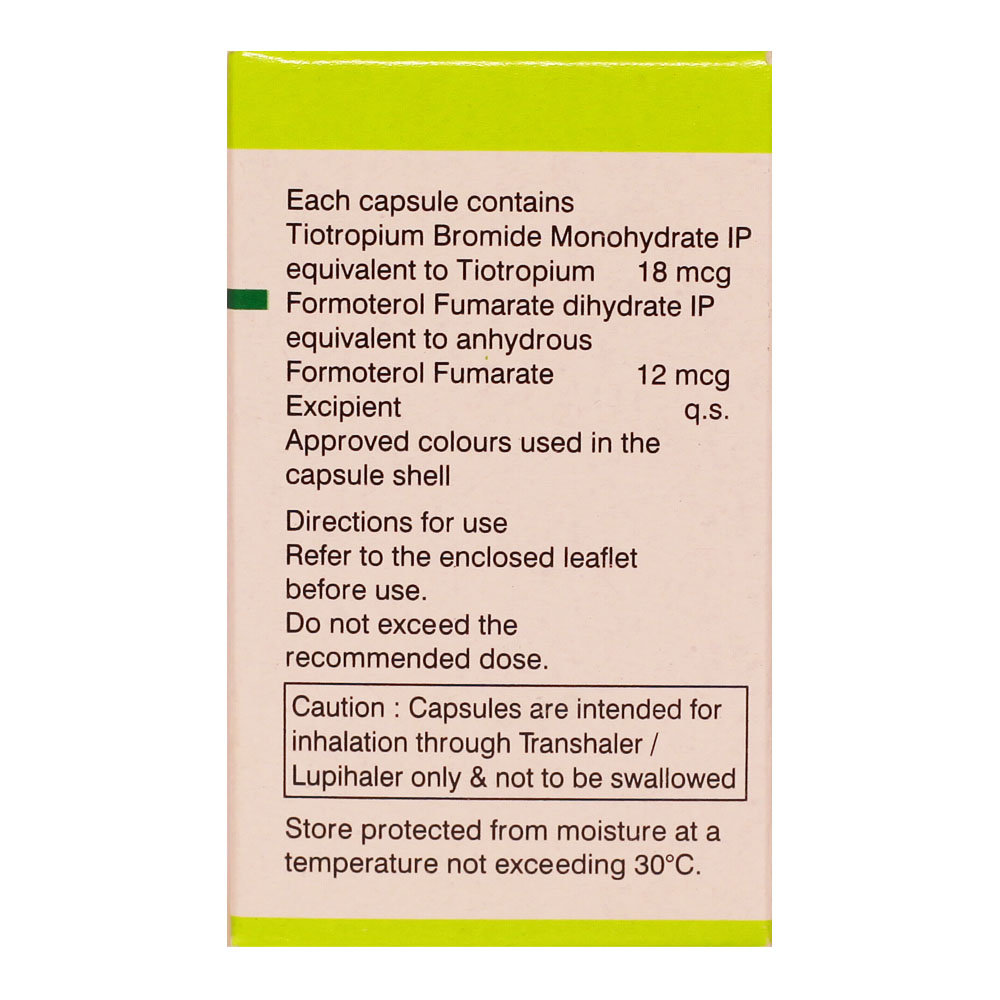
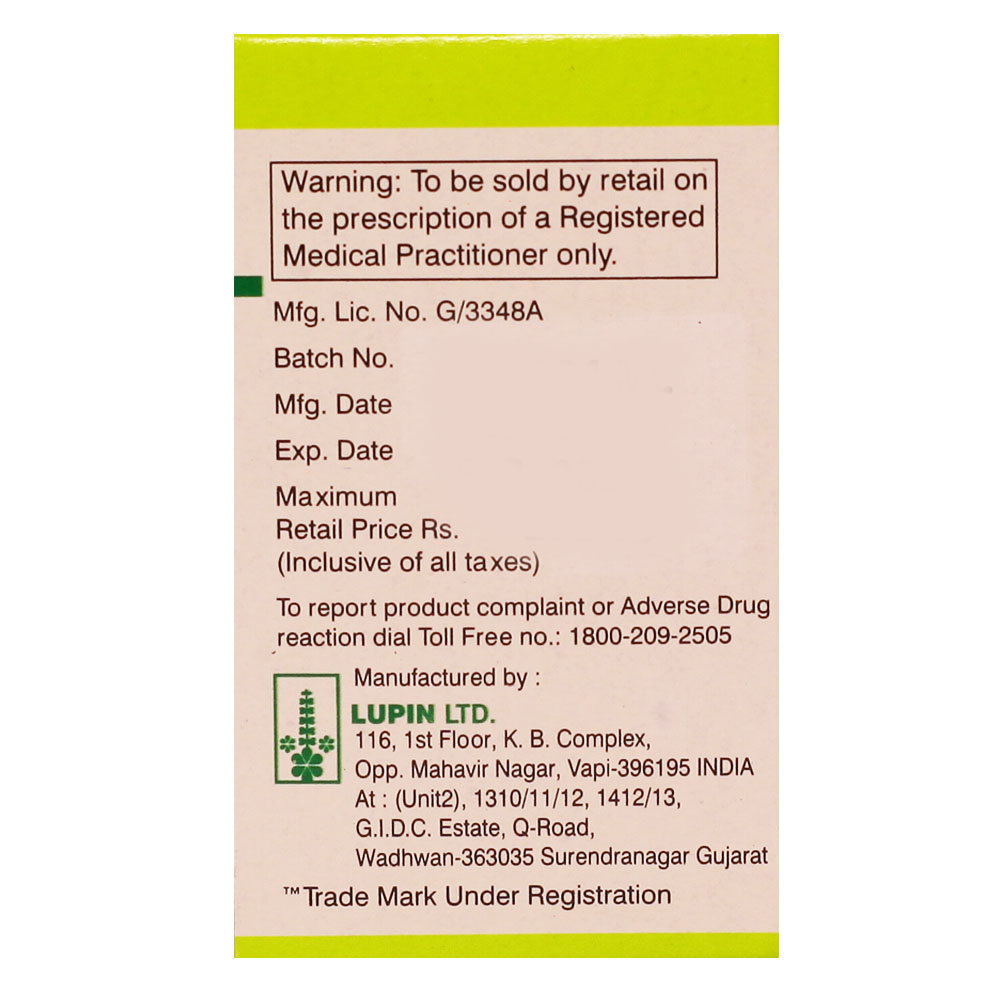
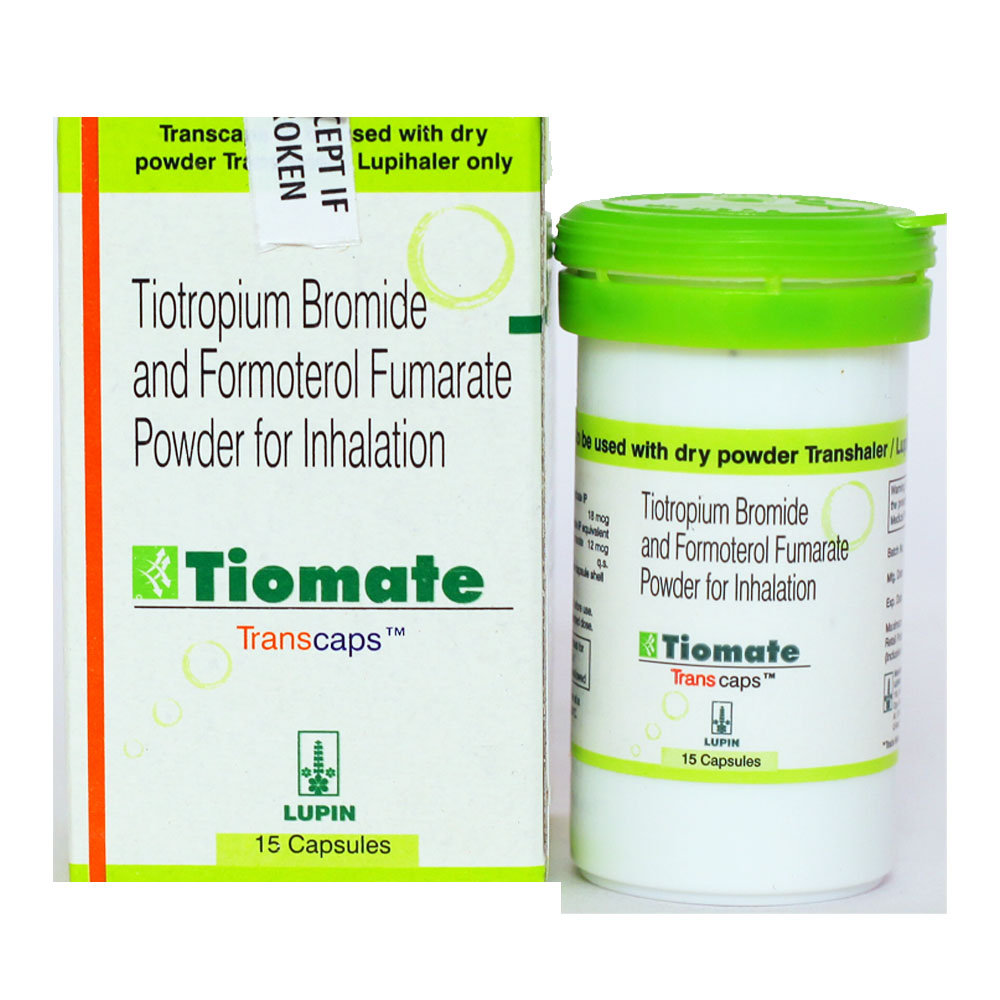
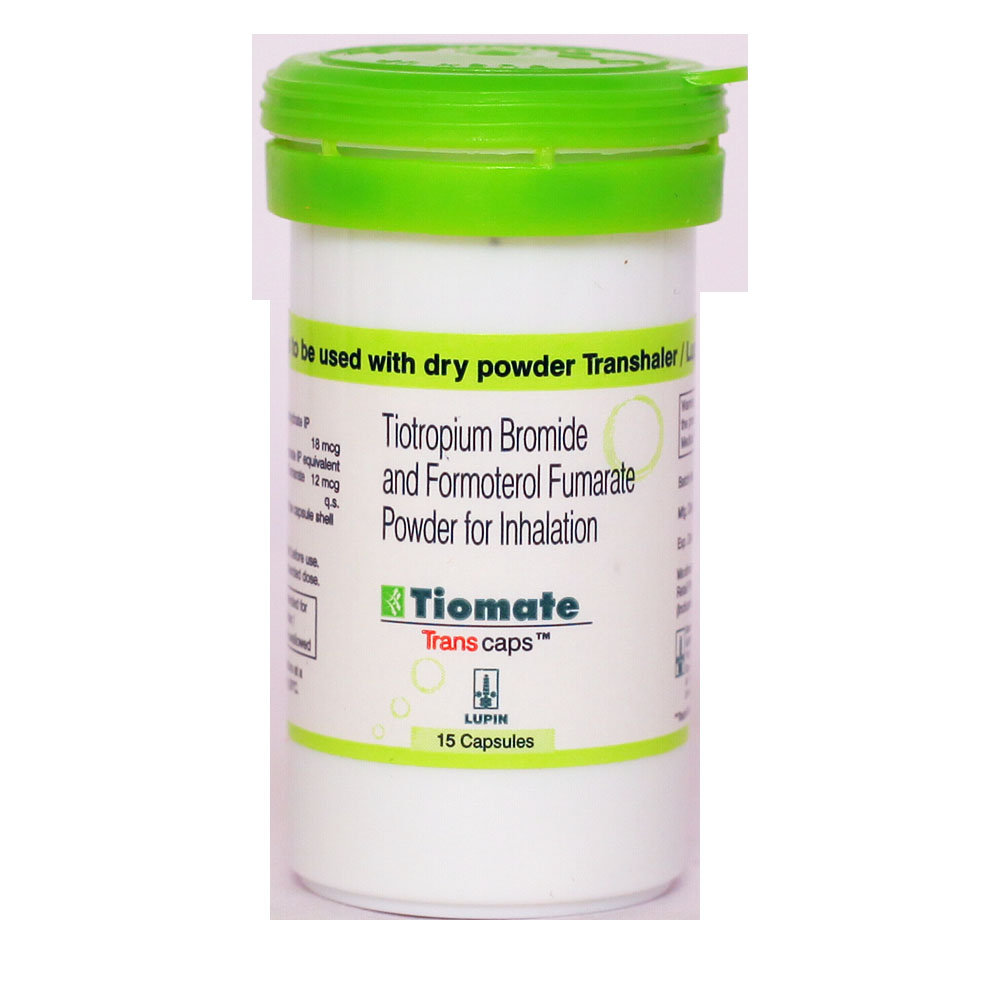





MRP ₹608
(Inclusive of all Taxes)
₹91.2 Cashback (15%)
Selected Pack Size:15
15 ₹547.2
(₹36.48 per unit)
In Stock
30 ₹547.2
(₹18.24 per unit)
In Stock
Provide Delivery Location
Online payment accepted
 Prescription drug
Prescription drugWhats That
Composition :
Manufacturer/Marketer :
Consume Type :
Return Policy :
Expires on or after :
About Tiomate Transcaps
Tiomate Transcaps is a respiratory medication primarily used to treat and prevent asthma and chronic obstructive pulmonary diseases (COPD) like bronchitis (inflammation of the lining of your bronchial tubes) and emphysema (shortness of breath). Asthma is a chronic (long-term) respiratory condition in which airways narrow, swell and produce extra mucus, leading to difficulty breathing. COPD is a group of lung diseases that causes obstructed airflow from the lungs.
Tiomate Transcaps is a combination of Formoterol (bronchodilator) and Tiotropium (anticholinergic). Formoterol relaxes the muscles in the airways and increases airflow to the lungs. Formoterol makes breathing easier by widening the airways. Tiotropium works by blocking the receptors for acetylcholine released in the cholinergic nerve endings in the airways. Tiomate Transcaps relaxes and widens the airway's openings, making it easier for the air to get in and out of the lungs. Thereby, it helps to prevent asthma attacks.
Your doctor will advise on how often you need to use Tiomate Transcaps based on your medical condition. The common side effects of Tiomate Transcaps include nausea, vomiting, respiratory tract infection, headache, sore throat, cough, bone, muscle or joint pain, increased heart rate, chills, tiredness, and noisy breathing. Most of these side effects of Tiomate Transcaps do not require medical attention and gradually resolve over time. However, if the side effects are persistent, reach out to your doctor.
Do not use Tiomate Transcaps to treat sudden severe symptoms of asthma or as a rescue inhaler. Please check with your doctor if you are pregnant, breastfeeding, or taking other prescribed or non-prescribed medicines. Brief your medical history if you have heart, liver, or kidney diseases, high blood pressure, hypokalaemia (low potassium levels in the blood), aneurysm (swelling of an artery), pheochromocytoma (adrenal gland tumour), hyperadrenocorticism (high levels of cortisol), eye disorders like cataract and glaucoma, chickenpox or measles, immune system problem, seizure (fits), osteoporosis (weak and brittle bones) or diabetes.
Uses of Tiomate Transcaps
Directions for Use
Medicinal Benefits
Tiomate Transcaps is used to treat and prevent respiratory disorders like asthma and chronic obstructive pulmonary disease (COPD). Tiomate Transcaps improves pulmonary function and effectively treats and prevents the worsening of emphysema (shortness of breath) and chronic bronchitis (inflammation of the lining of your bronchial tubes). Tiomate Transcaps contains Formoterol (bronchodilator) and Tiotropium (anticholinergic). Formoterol is a long-acting β₂ agonist and bronchodilator. It relaxes the muscles in the airways and increases airflow to the lungs. It makes breathing easier by widening the airways. Tiotropium works by blocking the receptors for acetylcholine which are released in the cholinergic nerve endings in the airways.
Storage
- Inform your doctor about the symptoms you're experiencing due to medication.
- Your doctor may adjust your treatment plan, which could include changing your medication, adding new medications, or offering advice on managing your symptoms.
- Practice good hygiene, including frequent handwashing, avoiding close contact with others, and avoiding sharing utensils or personal items.
- Stay hydrated by drinking plenty of fluids to help loosen and clear mucus from your nose, throat, and airways.
- Get plenty of rest and engage in stress-reducing activities to help your body recover. If your symptoms don't subside or worsen, consult your doctor for further guidance.
- Chest pain may last for a while and needs immediate medical attention as it is a significant health issue to be attended to.
- Take rest and refrain from doing physical activity for a while, and restart after a few days.
- Try applying an ice pack to the strained area for at least 20 minutes thrice a day. Ice pack thus helps reduce inflammation.
- Sit upright and maintain proper posture if there is persistent chest pain. Use extra pillows to elevate your position and prop your chest up while sleeping.
- Exercise regularly and maintain a healthy weight.
- Manage cholesterol and blood pressure.
- Limit intake of caffeine and alcohol.
- Avoid vaping and tobacco smoke.
- Get enough sleep.
- Talk to your doctor about antiarrhythmic drugs or other medications to treat your condition.
- Hydrate your body: Drink enough water to prevent dehydration and headaches.
- Calm Your Mind: Deep breathing and meditation can help you relax and relieve stress.
- Rest and Recharge: Sleep for 7-8 hours to reduce headache triggers.
- Take rest: lie down in a quiet, dark environment.
- Cold or warm compresses can help reduce tension.
- Stay Upright: Maintain good posture to keep symptoms from getting worse.
- To treat headaches naturally, try acupuncture or massage therapy.
- Over-the-counter pain relievers include acetaminophen and ibuprofen.
- Prescription Assistance: Speak with your doctor about more substantial drug alternatives.
- Severe Headaches: Seek emergency medical assistance for sudden, severe headaches.
- Frequent Headaches: If you get reoccurring headaches, consult your doctor.
- Headaches with Symptoms: Seek medical attention if your headaches include fever, disorientation, or weakness.
- Notify your doctor immediately if you experience tremors or involuntary shaking after taking medication or adjusting your medication regimen.
- Your doctor may adjust your medication regimen or recommend alternative techniques like relaxation, meditation, or journaling to alleviate tremor symptoms.
- Your doctor may direct you to practice stress-reducing techniques, such as deep breathing exercises, yoga, or journaling.
- Regular physical activity, such as walking or jogging, can help reduce anxiety and alleviate tremor symptoms.
- Your doctor may recommend lifestyle changes, such as avoiding caffeine, getting enough sleep, and staying hydrated, to help manage tremors.
- Maintain regular follow-up appointments with your doctor to monitor tremor symptoms and adjust treatment plans as needed.
- Inform your doctor about dry mouth symptoms. They may adjust your medication regimen or prescribe additional medications to manage symptoms.
- Drink plenty of water throughout the day to help keep your mouth moist and alleviate dry mouth symptoms.
- Chew sugar-free gum or candies to increase saliva production and keep your mouth moisturized.
- Use saliva substitutes, such as mouthwashes or sprays, only if your doctor advises them to help moisturize your mouth and alleviate dry mouth symptoms.
- Avoid consuming smoking, alcohol, spicy or acidic foods, and other irritants that may aggravate dry mouth symptoms.
- Schedule regular dental check-ups to keep track of your oral health and handle any dry mouth issues as they arise.
- Talk to your doctor about oral potassium supplements.
- Eat potassium rich foods such as bananas, avocados, oranges, dark leafy greens, beans and peas, fish, spinach, milk and tomatoes.
Drug Warnings
Special precautions should be taken in patients with a fungal, bacterial, parasitic, or viral infection and tuberculosis since nasal or inhaled corticosteroids can cause secondary infections. Tiomate Transcaps can cause a rise in blood glucose levels. Hence monitor your blood glucose levels regularly and inform your doctor if you already have diabetes before using Tiomate Transcaps . Tiomate Transcaps may affect the unborn baby during pregnancy. Please let your doctor know if you plan to become pregnant or are already pregnant, or if you are a lactating mother. Tiomate Transcaps is not recommended for children below five years of age.
Drug-Drug Interactions
Drug-Drug Interactions
Login/Sign Up
Drug-Food Interactions
Drug-Food Interactions
Login/Sign Up
Diet & Lifestyle Advise
- Know your triggers like allergens, such as pollen, dust, and food items that make your asthma severe.
- Quit smoking and avoid passive smoking. Smoking also reduces the effectiveness of the medicine.
- Eat a healthy diet and exercise regularly to strengthen your breathing muscles and boost your immune system.
- Learning breathing exercises will help you move more air in and out of your lungs.
Side Effects of Tiomate Transcaps
- Nausea
- Vomiting
- Respiratory tract infection
- Headache
- Sore throat
- Cough
- Dry mouth
- Constipation
Habit Forming
Therapeutic Class
Drug-Diseases Interactions
Drug-Diseases Interactions
Login/Sign Up
FAQs
Tiomate Transcaps should be cautiously administered under the doctor's guidance in seizures since bronchodilators like Formoterol can cause central nervous system stimulation that can lead to other adverse conditions. Please consult your doctor before using Tiomate Transcaps if you have seizures.
Tiomate Transcaps contains bronchodilator, which can cause a rise in blood glucose levels. Hence therapy with Tiomate Transcaps is cautiously administered in patients with diabetes. Please monitor your blood glucose levels regularly and inform your doctor so the dose can be adjusted accordingly.
Bronchodilator (Formoterol) in Tiomate Transcaps may decrease the potassium levels in your body, therefore should be used with caution. Please consult your doctor if you have any concerns.
Take the missed dose as soon as possible. However, if it is time for the next dose, skip the missed dose and go back to your regular dosing schedule.
Formoterol in Tiomate Transcaps may cause dry mouth as a temporary side effect in some people. It is not necessary for everyone taking Tiomate Transcaps to experience this side effect. However, to avoid such side effects, drink plenty of water, regularly rinse your mouth, practice good oral hygiene and suck on sugarless candy. However, if the condition persists or worsens, please consult a doctor.
Tiomate Transcaps is not recommended for use when you are taking Sotalol or vice versa. Sotalol and Tiomate Transcaps have opposing effects on the body. Sotalol may also trigger asthma attacks or worsen your breathing problems by narrowing the airways. Please consult your doctor before using other medicines with Tiomate Transcaps .
Tiomate Transcaps is not used for sudden breathing problems; your doctor may suggest a rescue inhaler for sudden breathing problems.
Drug-Drug Interactions Checker List
- BECLOMETASONE
- MOMETASONE
- BUDESONIDE
- IPRATROPIUM
- SALMETEROL
- VILANTEROL
- ALBUTEROL
- METOPROLOL
- SOTALOL
Special Advise
- It is advised to undergo a blood examination to keep a check on your potassium levels since Tiomate Transcaps can cause low potassium levels in the blood (hypokalaemia).
- Regularly monitor your blood sugar levels while using Tiomate Transcaps since bronchodilators like Formoterol can cause low blood glucose levels.
- Consult your diabetologist if you have diabetes before using Tiomate Transcaps so that your insulin or other diabetic medication can be adjusted accordingly to maintain your blood sugar levels.
Disease/Condition Glossary
Asthma: It is a breathing problem in which airways narrow, swell and produce extra mucus, leading to difficulty breathing.
Chronic obstructive pulmonary disease (COPD): It is a group of lung diseases that block airflow and make breathing difficult. The most common COPD is emphysema and chronic bronchitis.
Emphysema: It is a lung condition that causes shortness of breath.
Chronic Bronchitis: A lung disease associated with inflammation of the lining of bronchial tubes, which carry air to and from the lungs.

Have a query?
Buy best Respiratory System products by
Cipla Ltd
Lupin Ltd
Glenmark Pharmaceuticals Ltd
Sun Pharmaceutical Industries Ltd
Alkem Laboratories Ltd
Macleods Pharmaceuticals Ltd
Mankind Pharma Pvt Ltd
Zydus Healthcare Ltd
Leeford Healthcare Ltd
Dr Reddy's Laboratories Ltd
Zydus Cadila
Abbott India Ltd
Intas Pharmaceuticals Ltd
Alembic Pharmaceuticals Ltd
German Remedies Ltd
Centaur Pharmaceuticals Pvt Ltd
Ipca Laboratories Ltd
Aristo Pharmaceuticals Pvt Ltd
Pristine Pearl Pharma Pvt Ltd
Wockhardt Ltd
GlaxoSmithKline Pharmaceuticals Ltd
Zuventus Healthcare Ltd
Koye Pharmaceuticals Pvt Ltd
Micro Labs Ltd
Blue Cross Laboratories Pvt Ltd
Medishri Healthcare Pvt Ltd
Med Manor Organics Pvt Ltd
Indiabulls Pharmaceuticals Pvt Ltd
Adonis Laboratories Pvt Ltd
FDC Ltd
Fourrts India Laboratories Pvt Ltd
Tablets India Ltd
J B Chemicals & Pharmaceuticals Ltd
Shreya Life Sciences Pvt Ltd
Divine Savior Pvt Ltd
Indoco Remedies Ltd
Seagull Pharmaceutical Pvt Ltd
Yash Pharma Laboratories Pvt Ltd
Torque Pharmaceuticals Pvt Ltd
Uniza Healthcare Llp
Wings Pharmacuticals Pvt Ltd
Biological E Ltd
Corona Remedies Pvt Ltd
Icarus Health Care Pvt Ltd
Steris Healthcare
Apex Laboratories Pvt Ltd
Geno Pharmaceuticals Pvt Ltd
Navil Laboratories Pvt Ltd
Precept Pharma
Aar Ess Remedies Pvt Ltd
La Renon Healthcare Pvt Ltd
Torrent Pharmaceuticals Ltd
Astra Zeneca Pharma India Ltd
Biochem Pharmaceutical Industries Ltd
Comed Chemicals Ltd
Entod Pharmaceuticals Ltd
Franco Indian Pharmaceuticals Pvt Ltd
Healthgate Pvt Ltd
Intra Life Pvt Ltd
Megma Healthcare Pvt Ltd
Pfizer Ltd
RPG Life Sciences Ltd
Unipark Biotech Pvt Ltd
Votary Laboratories (India) Ltd
Wanbury Ltd
Brinton Pharmaceuticals Ltd
Dolvis Bio Pharma Pvt Ltd
Eisen Pharmaceutical Co Pvt Ltd
Group Pharmaceuticals Ltd
Knoll Pharmaceuticals Ltd
Morepen Laboratories Ltd
Panacea Biotec Ltd
Prevego Healthcare & Research Pvt Ltd
Rnd Laboratories Pvt Ltd
Sanatra Healthcare Ltd
Skn Organics Pvt Ltd
Stedman Pharmaceuticals Pvt Ltd
Thuyam Life Pvt Ltd
Timon Pharmaceuticals Pvt Ltd
Aglowmed Pharmaceuticals Ltd
Ajanta Pharma Ltd
Alniche Life Sciences Pvt Ltd
Bio Warriors Pharmaceucticals Pvt Ltd
Biochemix Health Care Pvt Ltd
Cadila Healthcare Ltd
Cadila Pharmaceuticals Ltd
Caplet India Pvt Ltd
Chemo Healthcare Pvt Ltd
Delcure Life Sciences Ltd
East West Pharma India Pvt Ltd
Elder Pharmaceuticals Ltd
Embiotic Laboratories (P) Ltd
Emcee Pharmaceuticals (P) Ltd
Foregen Healthcare Ltd
Hetero Healthcare Pvt Ltd
Incite Pharmaceuticals
Iva Healthcare Pvt Ltd
Kepler Healthcare Pvt Ltd
Kristal Pharmaceuticals
Lincoln Pharmaceuticals Ltd
Alcohol
Unsafe
Avoid drinking alcohol while taking this medicine, as it can worsen your side effects.
Pregnancy
Unsafe
Tiomate Transcaps is not recommended to use during pregnancy since it may have harmful effects on the unborn baby. Please consult your doctor if you are planning to conceive or are already pregnant before starting Tiomate Transcaps .
Breast Feeding
Caution
It is not known if this drug passes into breast milk. Consult your doctor before breastfeeding.
Driving
Caution
Do not drive or operate machinery if you experience drowsiness and increased/uneven heart rate while using Tiomate Transcaps . This may affect your ability to drive. Seek medical attention if the symptoms persist longer.
Liver
Caution
Tiomate Transcaps should be used with caution in patients with liver diseases. Let your doctor know if you have any history of liver diseases or hepatic impairment. Your doctor will weigh the benefits and potential risks before prescribing Tiomate Transcaps .
Kidney
Caution
Tiomate Transcaps should be used with caution in patients with kidney diseases. Let your doctor know if you have any history of kidney diseases. Your doctor will weigh the benefits and potential risks before prescribing Tiomate Transcaps .
Children
Caution
Tiomate Transcaps is not recommended for use in children less than five years of age. The dose may have to be adjusted by your doctor depending on the condition of the child's disease and age.



